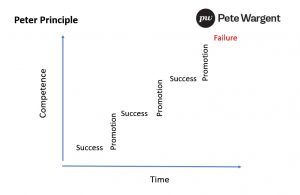Promotion to pain
Thinking back to my professional career days in Sydney, I can recall it being something of a ritual for staff to repair to Ryan’s Bar of a Friday afternoon to have a good old whinge about their respective bosses.
What on earth were the odds, I’d muse to myself, of all of these people having superiors that just aren’t quite up to their roles?
The answer, it appears, is…surprisingly high!
Incompetence reigns
In the 1960s the wryly amusing Peter Principle first held that people are promoted to the level of their incompetence, initially being intended as a satirical observation.
And yet we’ve all had experience of bosses & colleagues that appear to be painfully out of their depth, hinting that there’s more than a grain of truth in the concept (some studies have concluded in the same direction).
The theory goes that we keep getting promoted until we’ve reached a position we’re either not suitable or appropriately qualified for, at which point the wheels come off and we begin to perform badly.

This is related to the adage that ‘what got you here won’t get you to there‘ and the dreaded impostor phenomenon, and leads us towards the troubling conclusion that the world is being run by incompetent clods!
Some days that idea isn’t too hard to believe…
Overcoming the Peter Principle
The Peter Principle problem isn’t easily overcome, and is one that also faces entrepreneurs as they strive to be competent across a range of disciplines.
One decisive but uncharitable solution is fire people periodically if they aren’t progressing.
A radical (but alas probably unworkable) approach might be to promote people that are rubbish at their job – but a more dynamic & flexible organisational structure could certainly have merit.
Here are three other realistic suggestions:
(i) Promote the growth mindset – aim to advance performers with a growth mindset & an aptitude for continuous learning;
(ii) Outsourcing – some skills will always remain outside a manager’s circle of competence – can these be outsourced?; and
(iii) Managing up – traditionally in organisations what the boss says goes, but allowing for a more open and constructive relationship between managers and subordinates could help to prevent failings from being overlooked.
When I first trained as an accountant in London we were compelled to refer to the Partners as ‘Mr. Salomon’ (or whatever), and as junior staff lived in abject fear of making a balls-up.
Although this may sound a bit like I was apprenticed alongside Victorian chimney sweeps, it actually wasn’t all that long ago!
A vision for the future?
How about businesses and organisations that are more open, courageous, and honest, and that promote transparency, 360-degree feedback, and constructive dialogue between members?
We live in hope, though if life were that easy we’d all be heroes.
I fear the Peter Principle will walk among us for a good while yet!
Back to being incompetent…





